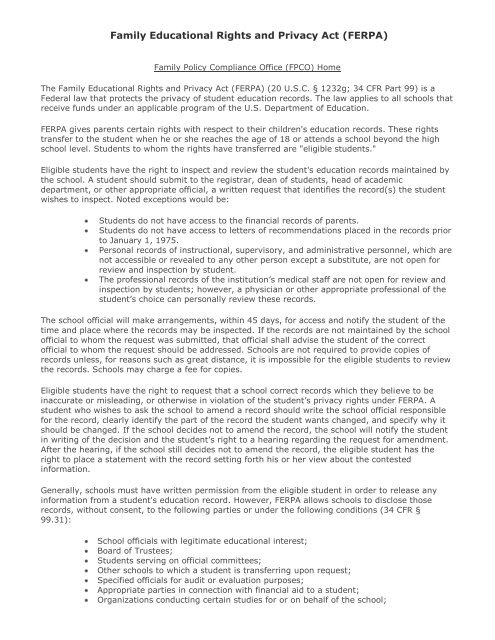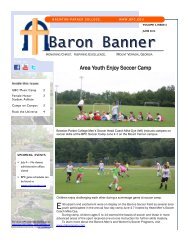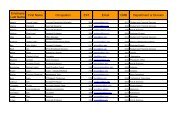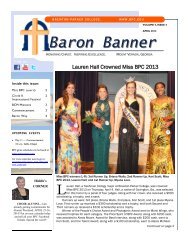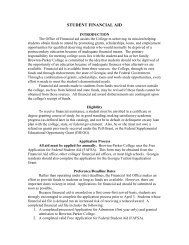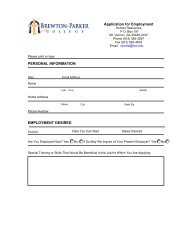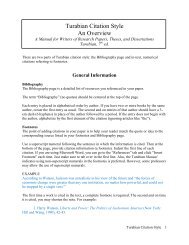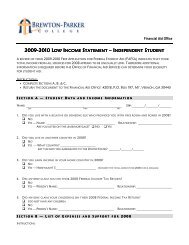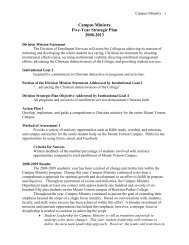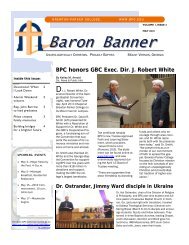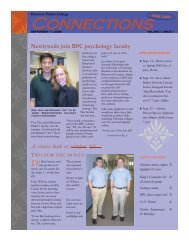Family Educational Rights and Privacy Act (FERPA)
Family Educational Rights and Privacy Act (FERPA)
Family Educational Rights and Privacy Act (FERPA)
Create successful ePaper yourself
Turn your PDF publications into a flip-book with our unique Google optimized e-Paper software.
<strong>Family</strong> <strong>Educational</strong> <strong>Rights</strong> <strong>and</strong> <strong>Privacy</strong> <strong>Act</strong> (<strong>FERPA</strong>)<strong>Family</strong> Policy Compliance Office (FPCO) HomeThe <strong>Family</strong> <strong>Educational</strong> <strong>Rights</strong> <strong>and</strong> <strong>Privacy</strong> <strong>Act</strong> (<strong>FERPA</strong>) (20 U.S.C. § 1232g; 34 CFR Part 99) is aFederal law that protects the privacy of student education records. The law applies to all schools thatreceive funds under an applicable program of the U.S. Department of Education.<strong>FERPA</strong> gives parents certain rights with respect to their children's education records. These rightstransfer to the student when he or she reaches the age of 18 or attends a school beyond the highschool level. Students to whom the rights have transferred are "eligible students."Eligible students have the right to inspect <strong>and</strong> review the student's education records maintained bythe school. A student should submit to the registrar, dean of students, head of academicdepartment, or other appropriate official, a written request that identifies the record(s) the studentwishes to inspect. Noted exceptions would be:Students do not have access to the financial records of parents.Students do not have access to letters of recommendations placed in the records priorto January 1, 1975.Personal records of instructional, supervisory, <strong>and</strong> administrative personnel, which arenot accessible or revealed to any other person except a substitute, are not open forreview <strong>and</strong> inspection by student.The professional records of the institution’s medical staff are not open for review <strong>and</strong>inspection by students; however, a physician or other appropriate professional of thestudent’s choice can personally review these records.The school official will make arrangements, within 45 days, for access <strong>and</strong> notify the student of thetime <strong>and</strong> place where the records may be inspected. If the records are not maintained by the schoolofficial to whom the request was submitted, that official shall advise the student of the correctofficial to whom the request should be addressed. Schools are not required to provide copies ofrecords unless, for reasons such as great distance, it is impossible for the eligible students to reviewthe records. Schools may charge a fee for copies.Eligible students have the right to request that a school correct records which they believe to beinaccurate or misleading, or otherwise in violation of the student’s privacy rights under <strong>FERPA</strong>. Astudent who wishes to ask the school to amend a record should write the school official responsiblefor the record, clearly identify the part of the record the student wants changed, <strong>and</strong> specify why itshould be changed. If the school decides not to amend the record, the school will notify the studentin writing of the decision <strong>and</strong> the student’s right to a hearing regarding the request for amendment.After the hearing, if the school still decides not to amend the record, the eligible student has theright to place a statement with the record setting forth his or her view about the contestedinformation.Generally, schools must have written permission from the eligible student in order to release anyinformation from a student's education record. However, <strong>FERPA</strong> allows schools to disclose thoserecords, without consent, to the following parties or under the following conditions (34 CFR §99.31):School officials with legitimate educational interest;Board of Trustees;Students serving on official committees;Other schools to which a student is transferring upon request;Specified officials for audit or evaluation purposes;Appropriate parties in connection with financial aid to a student;Organizations conducting certain studies for or on behalf of the school;
Accrediting organizations;Parents of an eligible student if the student is a dependent for IRS tax purposes;To a victim of an alleged perpetrator of a crime of violence or a non-forcible sexoffense, subject to the requirements of CFR § 99.39. The disclosure may only includethe final results of the disciplinary proceeding with respect to that alleged crime oroffense, regardless of the finding (CFR § 99.31 (a)(13));To the general public, the final results of a disciplinary proceeding, subject to therequirements of CFR § 99.39, if the school determines the student is an allegedperpetrator of a crime of violence or non-forcible sex offense <strong>and</strong> the student hascommitted a violation of the school’s rules or policies with respect to the allegationmade against him or her (CFR § 99.31(a)(14);Parents of a student regarding the student’s violation of any Federal, State, or locallaw, or of any rule or policy of the school, governing the use or possession of alcoholor a controlled substance if the school determines the student committed a disciplinaryviolation <strong>and</strong> the student is under the age of 21. (CFR §99.31)(a)(15))To comply with a judicial order or lawfully issued subpoena;Appropriate officials in cases of health <strong>and</strong> safety emergencies; <strong>and</strong>U.S. Comptroller General, U.S. Attorney General, U.S. Department of Education, state<strong>and</strong> local authorities.Schools may disclose, without consent, "directory" information such as a student's name, address,telephone number, date <strong>and</strong> place of birth, honors <strong>and</strong> awards, <strong>and</strong> dates of attendance. However,schools must tell eligible students about directory information <strong>and</strong> allow eligible students areasonable amount of time to request that the school not disclose directory information about them.Schools must notify eligible students annually of their rights under <strong>FERPA</strong>. The means of notificationincludes, but not limited to, student h<strong>and</strong>book, online catalog, registrar web page, new studentorientation <strong>and</strong> an annual email to all registered students, faculty <strong>and</strong> staff.Eligible students have the right to file a complaint with the U.S. Department of Education concerningalleged failures by the [School] to comply with the requirements of <strong>FERPA</strong>. The name <strong>and</strong> address ofthe Office that administers <strong>FERPA</strong> is:<strong>Family</strong> Policy Compliance OfficeU.S. Department of Education400 Maryl<strong>and</strong> Avenue, SWWashington, D.C. 20202-5920For additional information or technical assistance, you may call (202) 260-3887 (voice). Individualswho use TDD may call the Federal Information Relay Service at 1-800-877-8339.


